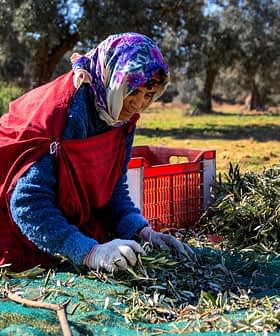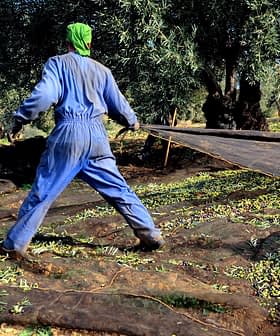Italy Introduces New Legislation to Promote Organic Production
The "Organic Made in Italy" label is just one component of a new national strategy to expand organic production and reward farmers for converting.
The Italian parliament has approved a new law creating an “Organic Made in Italy” label and national strategy to support organic production throughout the agricultural sector.
The law acknowledges the unique role of organic production for social development and environmental sustainability. It also provides funds for organic farming research and supports new strategic agreements among producers.
Organic extra virgin olive oil needs to be promoted, as organic producers favorably impact the environment and sustainability of olive farming.
The further development of organic food production will also be sustained through a special financing tool, the funds of which will mostly derive from a two percent “pollution tax” imposed on companies authorized to sell phytosanitary products considered potentially harmful to the environment.
The new law also promotes organic food production in the national and international markets. For this reason, all public canteens and public-funded institutions will recommend organic options.
See Also:A Carbon Credit Market in Italy Provides New Revenue Streams for Olive GrowersAccording to the major farming association, Coldiretti, the value of Italian organic food in 2021 reached €7.5 billion. Total organic food sales also have grown 122 percent in the last 10 years.
“Thanks to the new law, we will be able to further implement organic production in agrifood and all connected production chains,” said Francesco Battistoni, the undersecretary at the Italian Ministry of Agriculture, Food and Forestry. “On the world market, Italy comes second only after the United States regarding organic product exports.”
Battistoni also emphasized the relevance of the environmental benefits of adopting a national organic food production strategy.
The new law defines organic food production as an agricultural system that focuses on sustainability and restoring the natural environment while promoting human and animal wellbeing through food safety and ecosystem protection.
Organic olive growers in Italy told Olive Oil Times they hope that the new law would further sustain a sector that has steadily developed in the last decades with growing demand for healthy organic food.
“Our organic family olive farm has continued developing recent years, but it started in 1978, at a time when even the term organic was unheard of in the countryside,” Patrizio Di Carlo, general manager of Podere Panolfo in Umbria, told Olive Oil Times.
Panolfo was one of the first farms to have its extra virgin olive oil recognized by the European Union as Umbria PDO (Protected Designation of Origin) in 1998.
“Italy is one of the most relevant producers of organic agrifood, and many olive oil producers are organic,” Di Carlo said. “Still, organic extra virgin olive oil needs to be promoted, as organic producers favorably impact the environment and sustainability of olive farming.”
“When high quality is involved, the first question to ask is if the extra virgin olive oil has been produced with an organic or conventional approach,” he added. “Because quality is dependent not only on the polyphenols and flavors but also on the overall approach to farming, sustainability and actions such as getting rid of plastics or ensuring that workers can count on safety and a respectful working environment.”
According to data from the Institute of Services for the Agricultural and Food Market (Ismea), about 200,000 hectares of the more than one million hectares dedicated to olive growing in Italy comprise organic farms.
The Italian national system for information on organic agriculture, Sinab, emphasized how Italy has the highest percentage of organic olive growing in Europe.
While organic extra virgin olive oil constitutes eleven percent of all national production, its value reaches fifteen percent due to its higher prices in the market.
By comparison, eight percent of olive groves in Spain (about 220,000 hectares), the world’s largest olive oil-producing country, are certified organic.
Both Spain and Italy have been enacting strategies to boost the share of olive oil in the market.
Among the goals of the new Italian strategy is to encourage small food-producing companies to adopt organic farming.
The initiative is relevant for the olive sector since 97 percent of all olive farming businesses in the country are managed by a single individual.
Coldiretti also said the legislation deploys new digital and information technology tools to “ensure full transparency about the origin, the quality and the traceability of the products.”
The new law follows the path designed by the European Union’s Green Deal and Farm to Fork strategy. It also meets the requirements of the new Common Agricultural Policy (CAP), which will determine the amount of funds that will be devoted to E.U. agriculture between 2023 and 2027.
A few days ago, the European Commission announced the launch of the first edition of its E.U. Organic Awards, which will recognize organic food producers and experiences. The goal is to increase demand for organic products among European consumers.
“Given the CAP and the national strategies, the Italian organic sector should be able to count on €630 million per year,” said Angelo Frascarelli, an economist at the University of Perugia.
According to WineNews, Frascarelli also hinted that farmers need to connect geographical indicators (PGI and PDO) with organic products.
“Our agriculture has high production costs and must sell at higher prices its products which, beyond their specific quality, bring with them emotional and local values,” he said.
The new law also created a “technical roundtable for organic farming.” It will identify solutions and priorities for implementing the national organic farming strategy, including new plans for converting conventional agrifood companies to organic farming and assisting new farmers in the organic market.
The roundtable will give its opinion on new rules and laws discussed and approved at a national and European level and propose organic food production promotional activities.
The Italian organic farmers’ associations noted the strategic relevance of the new law, which, they said, will offer new business opportunities to the younger generations and give new value to rural areas while also sustaining biodiversity and mitigating climate change.
“With 15 years in the making, the new law is essential to support agroecological conversion, allowing Italy to take advantage of the economic support dedicated to this certified sustainable agriculture to grow the sector both in terms of production and consumption,” five of Italy’s leading organic farmers’ associations said in a press release.
“Thanks to this law, organic farming can become the engine for relaunching the entire agri-food sector,” the associations added. “Italy has a strong organic vocation, which must be increased and enhanced with investments in research, innovation, training and communication to continue to be a leader among the European countries.”








